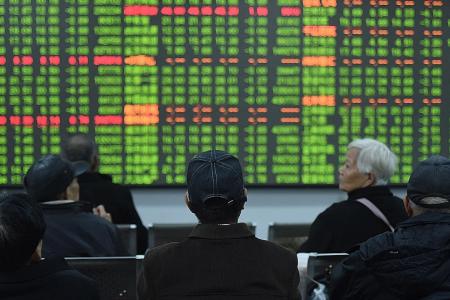Virus worries wipe out $538 billion off China’s stock market
Biggest fall in four years due to investors selling the yuan and dumping commodities over virus fears
SHANGHAI/HONG KONG: Investors erased US$393 billion (S$538 billion) from China's benchmark stock index yesterday, sold the yuan and dumped commodities as fears about the spreading coronavirus and its economic impact drove selling on the first day of trade in China since the Chinese New Year.
A nearly 8 per cent plunge on the Shanghai composite index was its biggest daily fall in more than four years. The Chinese yuan blew past the 7-per-dollar mark and Shanghai-traded commodities from palm oil to copper hit their maximum down limits.
The wipeout came even as the central bank made its biggest cash injection to the financial system since 2004 and despite apparent regulatory moves to curb selling.
The total number of deaths in China from the coronavirus rose to more than 360 by Sunday, compared with 17 on Jan 23, when Chinese markets last traded.
"You wanted to know what a real decoupling from China might look like, or what a 'What if everyone just stayed at home and didn't buy anything?' economic thought-experiment looks like?
"Well here you are, folks," Rabobank strategist Michael Every said in an afternoon note.
The yuan began onshore trade at its weakest this year and was down 1.2 per cent by the afternoon, sliding past the symbolic 7-per-dollar level to close at 7.0257.
Shanghai-traded oil, iron ore, copper and soft commodities contracts all posted sharp drops, catching up with sliding global prices.
The new virus has created alarm because it is spreading quickly, much about it is unknown, and the authorities' drastic response is likely to drag on economic growth.
"This will last for some time," said Ms Iris Pang, Greater China economist at ING.
"It is uncertain whether factory workers, or how many of them, will return," she said. "We haven't yet seen corporate earnings since the (spread of the) coronavirus. Restaurants and retailers may have very little sales."
More than 2,500 stocks fell by the daily limit of 10 per cent. The Shanghai Composite closed down 7.7 per cent at 2,746.6, its lowest since August and a modest recovery from early trade, when it was down nearly 9 per cent.
The People's Bank of China (PBOC) said the stock plunge had irrational or even panic elements, triggered by herd behaviour, in a newspaper commentary published after markets closed.
The sell-off cast a pall over Asia, though losses were contained because a slide had been expected. Hong Kong's Hang Seng, which shed almost 10 per cent in two weeks, closed 0.2 per cent firmer.
In Singapore, stocks fell steadily throughout the session, with the Straits Times Index down as much as 1.26 per cent in its final hour of trading.
The benchmark eventually closed down 1.19 per cent or 37.42 points to 3,116.31, weighed down by financial and real estate stocks, The Business Times reported.
Amid the selldown, the PBOC had injected 1.2 trillion yuan (S$239 billion) into money markets through reverse bond repurchase agreements, the largest such move since 2004, according to DBS analysts.
It also unexpectedly cut the interest rate on those short-term funding facilities by 10 basis points.
"It is a clear message that they want to take growth-supportive measures and keep the market reassured," macro strategist Mayank Mishra at Standard Chartered Bank in Singapore said of the PBOC move.
"They are managing the situation well. The timing of the repo rate cut came a little quicker than some people were expecting, but they wanted to send a clear message."
Beijing has also said it would help firms that produce vital goods resume work as soon as possible. - REUTERS
Get The New Paper on your phone with the free TNP app. Download from the Apple App Store or Google Play Store now



